October 20/14 8:51 am - Canadian Cycling Profile: Louise Lalonde
Posted by Editor on 10/20/14
This is the first of what will, hopefully, be a series of profiles on the people who work tirelessly for the sport of cycling in Canada. If you know of someone who should be profiled, please contact us.
Emil van Dijk spoke with riders, coaches, team managers and other commissaires about Louise Lalonde, who is primarily known as a road commissaire, but has also worked as a race director for many races, with a career as a volunteer stretching back over 45 years.
Louise Lalonde - A Canadian Trailblazer
The primary focus at sporting events is rightfully on the participants, but behind the scenes are individuals who provide the framework that ensures the competition takes place. One such person is cycling commissaire Louise Lalonde, who, on November 2nd, will be inducted into the Fédération Québecoise des Sports Cyclistes Hall of Fame.
After graduating from high school in 1967, Lalonde moved from Saint-Eustache to Montréal to begin work as a secretary for the city government. Eager to meet people, the 17-year old accepted an invitation from a colleague to watch a bicycle race on Mont Royal.
Captivated by the event's spectacle and energy, the crowd's enthusiasm, and the athletic young men riding their bicycles, the experience was the first step in a cycling journey that has continued for the better part of five decades.
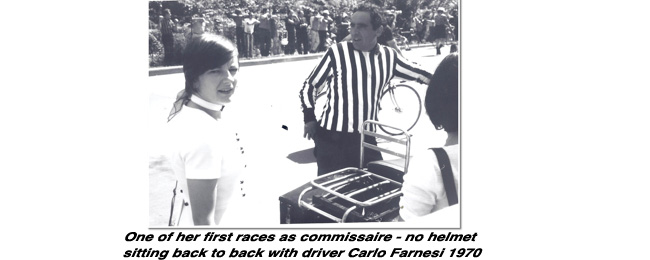
Highly regarded as an international commissaire for road, track and para-cycling, Lalonde is also qualified to officiate in mountain biking, cyclo-cross, BMX and anti-doping. She has served at countless events, from local races to the Olympics, and has also functioned as a club manager and team owner, as well as race organizer and director.
Furthermore, as a UCI-certified instructor, she has taught hundreds of people the nuances of officiating cycling competitions. By her own estimate, all current international commissaires from Québec, New Brunswick and Ontario once sat before her as students. Lalonde was also the first person certified by the UCI to train commissaires in the discipline of para-cycling, and wrote the initial curriculum.
"The reason I like being an official is that I'm always with the athletes," explains Lalonde. "It's a good environment. People are always giving their maximum."
Testimonials
"She is one of the great commissaires, male or female," says Denise Kelly, who has a long history with Lalonde, both as a former racer and now as head coach of the Women's National Road Program. "Louise adds a lot to our sport and to the Canadian profile on the international scene."
"There are not too many of us who have been in the sport so long. It's a really good thing for the sport when we have good, consistent, fair people who last a long time. Somebody who has been in the sport that long has that history and all the experiences to go by. That in itself is a very neat thing - that continuity."
Like Kelly, Optum Pro Cycling director Kevin Field also raced in Québec in the '80s and '90s, and has managed numerous teams since. "Louise has seen a lot and done a lot, from working with clubs and the federation, to organizing races and officiating. A person with this breadth of experience and passion is invaluable to the sport. She's seen it all!"
Both Kelly and Field point to Lalonde's fair and forthright manner as reasons why she is so well respected. "She's definitely a straight shooter," explains Kelly. "There's no ambiguity and you know where you lie. She certainly knows the rules and sticks by the rules. She could be pretty rigid but in certain cases she would be a bit more flexible. I like her approach. She's very fair. She is friendly. She would call you out on things, but doesn't let anything really go by."
Field recalls an exemplary incident during a mid-'90s edition of the Tour de Beauce: "I was directing JetFuel and Buck Miller was an up-and-coming rider. But, like so many guys in their first couple of goes at Beauce, the race was hard and he was on the ropes. Riders (and team directors) do 'push' the rules in races quite a bit. Ninety percent of the time this is done just to keep a player in the game. Bike racing can be unforgiving, and a sticky bottle, drafting in the caravan or what not is not done with malicious intent. It's done when a guy's on the ropes, or to get out of a crappy or unlucky situation, like an ill-timed mechanical or unlucky crash."
"Buck's problem was tired legs. It was the criterium with one day to go. He was just fried. He cheated by stopping on the roadside and letting the air out of his tire for a fake mechanical. He just needed that free lap. Another commissaire saw him do it and he was caught. In the official results he was DQ'd. It was dumb, but it's not the first time a rider has tried this move."
"We went to Louise and I told Buck 'Just 'fess up, be honest and tell Louise you know you were wrong; you were desperate. And apologize.' After discussing it honestly with Louise she agreed to let him back in the race with a fine and a time penalty. She was calm, reasonable and fair - a good example of how she sees the race context and makes balanced decisions. I really appreciated it at the time. Louise understood how important it is for a young rider to 'just get through Beauce'. I don't think Buck ended up finishing - like so many guys he was dropped on the St. Georges circuit. But it was important for him to try to finish and Louise let him do that. It also showed him that commissaires aren't all 'meanies' and you can discuss race situations with them reasonably."
"One of the traits that I admire a lot is that she recognized professionalism," adds Kelly. "If a director or manager brought everything at once, all the documentation, all the athletes, she really acknowledged if that was done properly. She would certainly give you shit if it wasn't done right but she would also acknowledge when you did something properly. She was always impressed when athletes were well behaved and polite and respectful. She gave out that same vibe as well."
Canadian Cyclist editor Rob Jones tells an interesting story about Lalonde that took place around 1990. At the time he was managing the Specialized elite women's team at the Montréal Classic, one of the biggest stage races in North America. Lalonde was the chief official and had a group of trainee commissaires assisting her.
Because of the vast range of ability among the competitors, the criterium stage became very confusing, with many riders being lapped numerous times. Once the results were posted, Specialized's team leader, Edie Fisher, was scored as having been lapped five times, which Jones knew to be incorrect. The accompanying time penalty would put her out of contention for a top placing.
Jones tried to persuade Lalonde that the results were wrong. Since it was the first of two stages on the day, she said the issue would be discussed after the ensuing time trial, but told him: "This is what my official said, and I'm going with what my official said."
In the time trial, Fisher finished second behind French star Marion Clignet, prompting Jones to ask Lalonde "Now, do you really believe Edie was lapped five times?" "I'm not going to change that," replied Lalonde, "But I can talk about the time penalty."
"We came up with an agreeable solution to the penalty that was going to be applied," explains Jones. "Louise was able to avoid throwing her official under the bus, but was still able to work with me as a team manager to come up with an acceptable solution."
Now, as a cycling journalist and photographer, Jones works with Louise in a different capacity. "Just like the mechanics, directors and riders, I have a role in the event - reporting and documenting it," he explains. "Whether it is on a motorcyle in a road race, inside the barriers at a mountain bike event, or on the track apron, I need to be there to do my job properly."
"Some officials consider us an unnecessary nuisance and irritant in the smooth functioning of 'their' race. Louise has never been like that. She recognizes the important role that I and others play, and does her best to help us."
"However," Jones continues, "it's a double-edged sword; if you do something boneheaded like get your moto stuck in the middle of the bunch when it shouldn't be there, you will definitely hear about it, and possibly lose some of those privileges."
Early Years
Shortly after that first race in 1967, Lalonde answered a newspaper ad and attended a meeting of the Montréal region cycling group. One of only four people in attendance - "I thought I was going there to make friends" - she was immediately elected secretary of the region and started going to bike races.
In 1970, influenced by Émile "Pompom" Miron and Roger Raux, both now members of the Québec cycling hall of fame, Lalonde took the officials course and became a commissaire. Her mentor in those early days was Lucien Bailly, technical director of the Fédération Cycliste du Québec (as it was then known), who provided guidance as she learned the nuances of presiding over races.
At the time she was one of four female officials in Québec, two of whom married a cyclist. For a period in the mid-70's Lalonde stopped attending events out of deference to her husband who, having retired from competition, found watching races too difficult to stomach.
Her involvement in cycling continued uninterrupted, however, as she managed the club she started in 1974 prior to that year's Québec Games. A rule at the time stipulated that riders had to be attached to a club in order to participate in the provincial games, so Lalonde formed the club to allow formerly independent riders to compete. She joined the FCQ board in 1976, a position she retains to this day.
In 1979, after the resolution of a political tiff between the FCQ and the Canadian Cycling Association, Lalonde came back for a few events at the request of race organizer Federico Corneli. When her marriage ended in 1983, she returned to officiating on a full-time basis, spending her weekends either as a commissaire or helping her club. "For a while I thought people wouldn't like that I was an official and a club owner, but I proved to them that I was more strict because I knew my guys, my club members, without looking at their numbers. If they made an infraction I could tell without having to see their number, which I would do for an athlete from another club."
Eager to expand her horizons and learn new skills, Lalonde began taking courses to improve her qualifications, eventually becoming an international commissaire in all disciplines except BMX, in which she is a national-level official. UCI rules prevent a person becoming internationally certified in a discipline after age 50, and it was after the mid-century mark that Lalonde became involved in BMX.
Acceptance
Despite being a woman in a male-dominated sport, Lalonde has always felt accepted, especially in Canada. "Never once have I felt that they did not see me as equal to any male official," she says of the cyclists and race organizers with whom she worked.
The only exception occurred in 1986, when she took a course in Colorado Springs in order to qualify as an international commissaire. Graduates of the course would be classified as either A-level or B-level, depending on test results. Achieving an A-level would allow a commissaire to work at multi-week stage races.
Michel Jekiel, then general secretary of the UCI (ie, President) told the class, which contained Lalonde and two American women, that women could not become A-level commissaires because, in his opinion, it was impossible for a woman to work more than seven days without getting too tired. "We looked at each other, the three women who were there, and we could not believe that someone would say something like that."
As fate would have it, all of the students scored at the B-level. "That actually was a good thing," recalls Lalonde. "In order to obtain my A-level I was invited to go for upgrades in Europe, and then became known because of that. People knew me; they knew how I worked. I had a chance to show them I could be a good official."
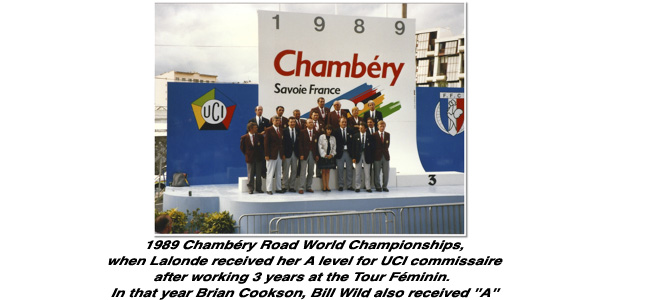
Lalonde eventually did achieve her A-level, and although Jekiel never apologized, he did later admit that to her that "things have changed. I now realize that women can do as good a job as the men."
More trips to Europe followed, and Lalonde was the first woman ever invited by the Société du Tour de France to work at one of their events, in her case the 1987 Tour Cycliste Féminin, which ran concurrently with the Tour de France. On the rest days, instead of taking a breather, she helped out at the men's race. In addition to the '87-'89 Tours Cycliste Féminin, Lalonde also worked the Tour Cycliste de la Communauté Européenne and the Tour de l'Avenir.
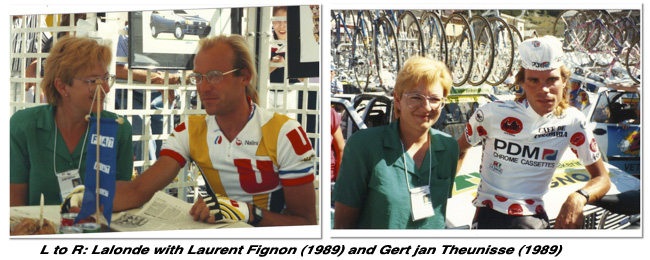
Another feather in her cap was her selection as chief commissaire for the cycling events at the 2004 Paralympic Games in Athens, the first woman ever to serve in that capacity. She also had the honour of reading the official's oath at the 2001 Canada Games in London. In 2004 she was recognized by the Sports Officials Canada Hall of Fame as the female official of the year.
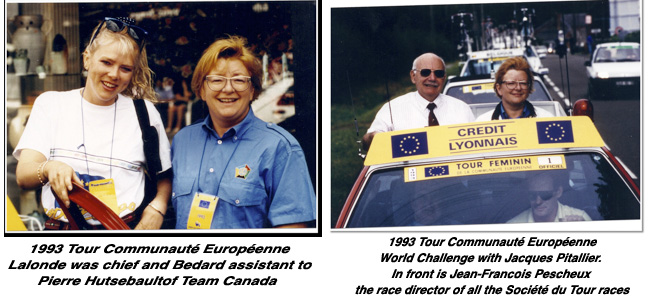
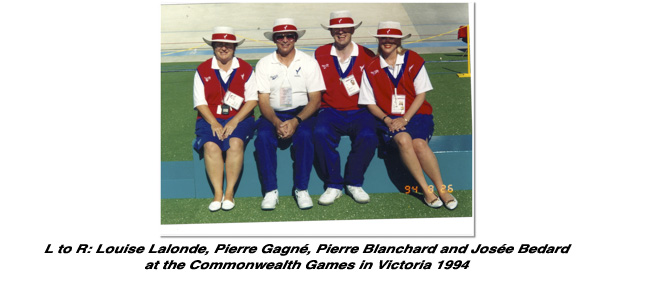
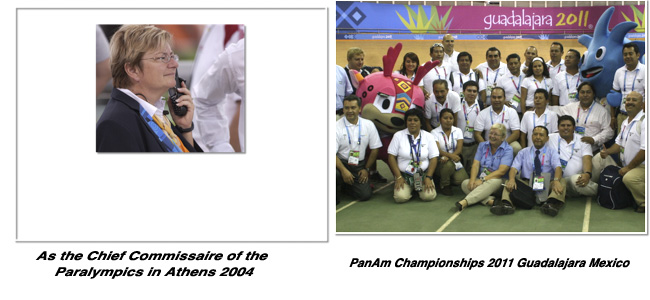
"To be in charge of, let's say, the Olympics or the Paralympics, you get a lot of satisfaction out of doing your work knowing that you're appreciated and also the fact that you're somewhere in the world that everyone would love to go and you're there and you're part of it."
One of her worst days occurred in 2013, when the UCI forced all international commissaires to narrow their focus to a select discipline or combination of disciplines. Where she was previously allowed to serve at the highest level in six of the seven disciplines, Lalonde is now restricted to three. "I still cannot get over this after two years," she admits. The restriction does not apply at provincial or national events.
Fellow comissaire Josée Bédard considers Lalonde to be her mentor. The two met in the mid-80s and have been friends ever since, with Lalonde initially offering guidance, advice and encouragement. "For sure she pushed me and she helped me a lot," admits Bédard. "Otherwise I don't think I would be an international commissaire. I was an international commissaire at 28 years old. She helped me a lot."
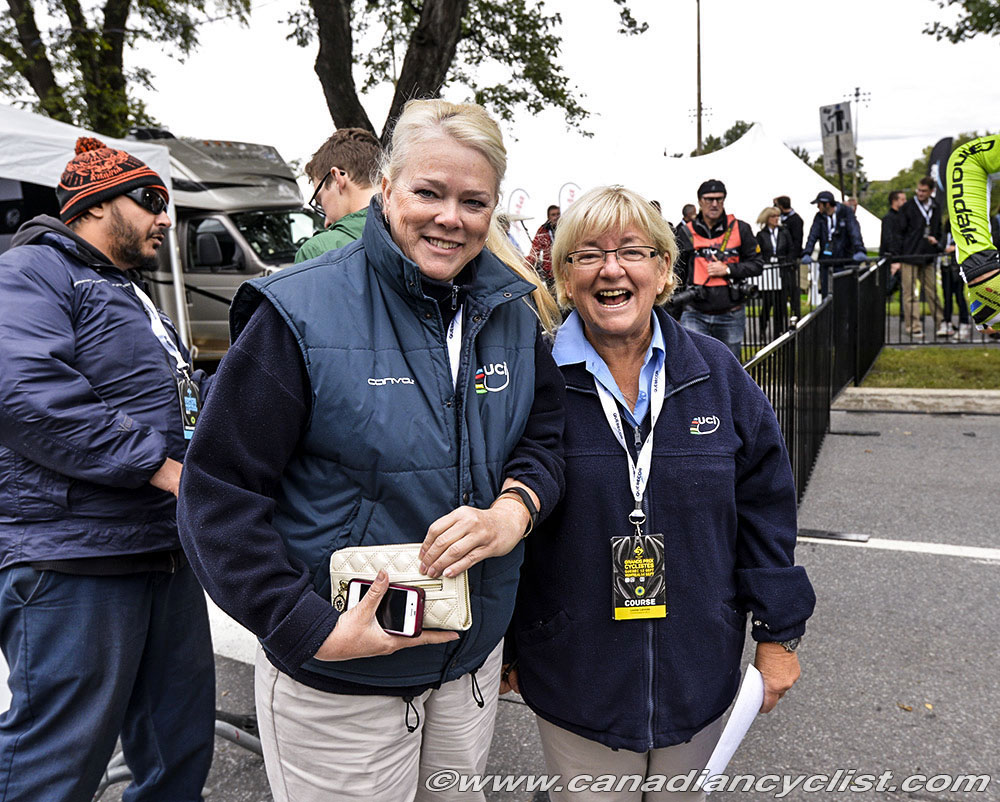
Canadian officials Josée Bédard and Louise Lalonde at the 2014 GP Montreal
UCI commissaires in road, track and para-cycling, the pair now serve as sounding boards for each other. "It's never black or white during a race," explains Bédard. "There are always gray zones, and I can always ask for her point of view. When there are new rules or exceptions we still talk about it. How she sees it and how I see it and we discuss it to try to see it from all points of view."
Having worked at major events such as the Beijing and London Olympic Games, Bédard recognizes the difficulties Lalonde faced in traveling to Europe to prove herself. "It was not easy for her when she started as an international commissaire. Coming from North America and being a woman it's a little bit harder because there were not a lot of women and they don't know you. When you're from Europe they see you often so they know you, but if you're coming from outside the continent it's more difficult. You have to be more prepared, more on top of everything."
"She is always working," says Bédard of Lalonde. "Whether it has to do with new rules, setting an exam or preparing for a course. She is doing a lot for cycling and she is not always paid for that. She is practically working full-time for cycling."
Changes & Challenges
Over the course of her career, Lalonde has witnessed plenty of changes, from the introduction of the new disciplines of mountain biking and BMX, to advancements in cycling gear and timing equipment. From a commissaire's perspective, however, the method of scoring a race is the same as it was in the '70s; the new technology has simply made it easier.
Lalonde is worried about the rising costs associated with cycling, whether it be insurance or increased safety and security concerns. Doping controversies make it difficult to attract sponsors, and the number of female participants in Québec has yet to rebound since the Geneviève Jeanson affair.
Retaining qualified commissaires is also a struggle, as many leave the sport when their children stop competing. According to Lalonde, a number of older officials are on the verge of retiring.
Advice
For anyone contemplating becoming a commissaire, Lalonde stresses the importance of pure motives and constant revision: "You really need to love the sport. There will be a lot of weekends you will not be at home. Always be ready to learn new ways of working and improving your skills. It's not enough to know the rules; it's the application of the rules and keeping up to date. We use the same rules as the UCI. Every time a UCI rule changes we have the same change in Canada so we need to know the reason behind the rules. In this way it's a lot easier to apply them."
"It's also about being there for the organizers. We have to be in a helping mode for the organizers and the athletes. It also has to be fun. If it's a job, it's no fun. You have to take it very seriously, but still have a lot of fun doing it."
Current & Future
After spending her entire working life with the city of Montréal, Lalonde was fortunate enough to be able to retire at age 50, and devote even more time to cycling. Whereas previously she had to take vacation days in order to attend distant events, since 2000 she has been able to take extra days before or after races in order to enjoy the sights with her second husband. Because of the commitment required at a competition, UCI rules prevent a commissaire from traveling with their partner. "If you are with someone then you don't do a good job," warns Lalonde. "I never travel during events with my spouse."
Since 1982, the Saint-Sauveur resident has been in charge of all Québec cycling officials, and has been on the board of officials at Cycling Canada. Both women's cycling and para-cycling are important to Lalonde, as so few organizers are willing to coordinate such contests. For the past two years she has served as race director for the Grand Prix Cycliste Gatineau, a UCI-sanctioned women's competition.
In January of 2015 Lalonde will celebrate her 65th birthday. The current age limit for international assignments is 70, but there are rumblings about reducing that to 65. She would dearly love to be the chief commissaire at the World Track Championships, but is realistic enough to know that is unlikely as she has not been shy about pointing out the faults of those responsible for doling out such tasks. Instead she hopes to be selected as chief of the track events at the Toronto Pan Am Games. Another of her goals is to visit Peru, Paraguay and Guyana, the only South American countries in she has yet to work.
"I still have at least five years," vows Lalonde. "If I'm still elected and still assigned, and people still respect me, I'll keep going. You don't know how many people come to me after a race and say 'Good job Louise' and 'Thank you Louise' or 'You've been very helpful'. That is my salary."
As proof of her longevity, Lalonde cites Joseph "Tino" Rossi, founder of the Mardis Lachine bike race. "I've seen three generations of riders. A good example is Tino Rossi. I knew him when he was racing. I've seen his children race and now I see his grandchildren racing. It's really something and I feel good to be part of it."
Major Cycling Events Attended
1989 World Championship Road in Chambery, France
1991 World Championship Track in Stuttgart, Germany
1992 Olympics in Barcelona, Spain
1993 Women's Tour of the European Community
1994 XV Commonwealth Games in Victoria, Canada
1994 World Championship Mountain Bike in Vail, USA
1998 Giro del Trentino in Italy
1998 World Championship Mountain Bike in Mont Ste-Anne, Canada
1999 World Championship Masters Mountain Bike in Bromont, Canada
1999 World Championship ''B'' Road & Track in Montevideo, Uruquay
2000 World Championship Masters Mountain Bike in Bromont, Canada
2000 World Championship Road in Plouay, France
2001 World Championship Juniors Track in Trexlertown, USA
2001 World Championship Masters Mountain Bike
2001 Tour de l'Avenir in France
2002 Commonwealth Games in Manchester, UK
2003 World Championship Road in Hamilton, Canada
2003 World Championship Masters Track in Manchester, UK
2004 World Championship Marathon Mountain Bike in Bad Goisern, Austria
2004 Paralympics in Athens, Greece
2005 Pan American Championships in Mexico
2005 World Masters Games in Edmonton, Canada
2006 World Championship Marathon Mountain Bike in Oisans, France
2006 World Championship Cyclo-Cross in Zeddam, Netherlands
2006 World Championship Para-cycling in Aigle, Switzerland
2006 Outgames Mondiaux in Montréal, Canada
2007 World Championship Junior Track in Aguascalientes, Mexico
2007 World Championship BMX, Victoria, Canada
2007 World Championship Para-cycling in Bordeaux, France
2008 Paralympics in Bejing, China
2009 World Championship Para-cycling Track in Manchester, UK
2009 World Championship Para-cycling Road in Bogogno, Italy
2009 World Championship Masters Track in Sydney, Australia
2010 World Championship Para-cycling in Baie Comeau, Canada
2010 World Championship Mountain Bike in Mont Ste-Anne, Canada
2010 World Championship Road in Melbourne, Australia
2011 World Championship Para-cycling Track in Montichiari, Italy
2011 Summer Universiade in Shenzhen, China
2011 Pan American Games in Guadalajara, Mexico
2012 World Championship Para-cycling Track in Los Angeles, USA
2013 World Championship Cyclo-cross in Louisville, USA
By Emil van Dijk
Related Photo Galleries
| Return to Cycling 4 Women homepage | Return to Canadian Cyclist homepage | Back to Top |


